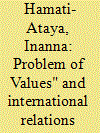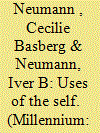| Srl | Item |
| 1 |
ID:
105720


|
|
|
|
|
| Publication |
2011.
|
| Summary/Abstract |
In light of recent discussions of cognitive and ethical dilemmas related to International Relations (IR) scholarship, this paper proposes to engage the "problem of values" in IR as a composite question whose cognitive treatment requires the objectivation of the more profoundly institutional and social processes that subtend its emergence and evolution within the discipline. This analysis is hereby offered as an exercise in reflexive scholarship. Insofar as the question of values constitutes a defining cognitive and moral concern for reflexive knowledge itself, the paper also points to the need for its reformulation within an epistemic framework that is capable of moving beyond reflexivity to Reflexivism proper, understood as a systematic socio-cognitive practice of reflexivity.
|
|
|
|
|
|
|
|
|
|
|
|
|
|
|
|
| 2 |
ID:
139418


|
|
|
|
|
| Summary/Abstract |
If the scholarly self is irretrievably tied to the world, then self-situating is a fruitful source of data production. The researcher becomes a producer, as opposed to a collector, of data. This how-to paper identifies three analytical stages where such self-situating takes place. Pre-field; there is autobiographical situating; in-field, there is field situating, and post-field, there is textual situating. Each of these stages are presented in terms of the three literatures that have done the most work on them – feminism, Gestalt, and poststructuralism. A number of how-to examples are used to illustrate. In conclusion, we discuss how two different methodological commitments to situatedness, which Jackson (2010) dubbed reflexivist and analyticist, give rise to two analytically distinct ways of using the scholarly self for data production. Reflexivists and analyticists approach data production from opposite ends of the researcher/informant relationship. Where a reflexivist researcher tends to handle the relation between interlocutor and researcher by asking how interlocutors affect the researcher, an analyticist researcher tends to ask how the researcher affects them.
|
|
|
|
|
|
|
|
|
|
|
|
|
|
|
|